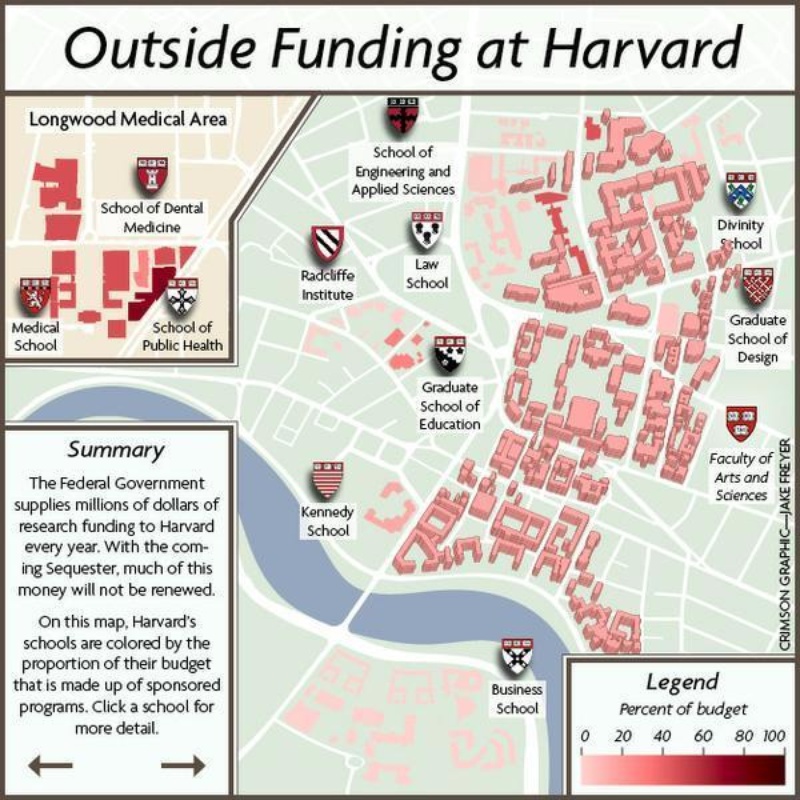Part I of a two-part series examining how the looming cuts in federal funding could impact research at Harvard. Part II ran on Feb. 26.
Without a deal to avert unprecedented federal spending cuts scheduled to take effect Friday, research institutions including Harvard could be days away from the most damaging reduction of research funding in recent memory.
The cuts—projected to be $85 billion from the federal balance sheets this fiscal year alone—are as unparalleled in scope as the problem, a $900 billion yearly federal deficit that Congress has forced itself to plug. As lawmakers warn of the threat such a deficit poses to federal government’s financial integrity, researchers and administrators at Harvard warn that what they call indiscriminate and poorly timed cuts could jeopardize the flow of new scientific ideas and those who generate them at a time when the economy stands to benefit from them more than ever.
In total, the automatic cuts to all federal programs, better known as sequestration, are slated to progressively trim $1.2 trillion over the next ten years. After years of flat funding and increased demand for federal sponsorship, the University’s researchers, investigators, and administrators say the cuts, if enacted, will cast a long shadow over research at Harvard, where individual labs from the Medical School to the Faculty of Art and Sciences received approximately $650 million in federal monies during the 2012 fiscal year.
Some agencies have already reduced grant totals in advance of the cuts, forcing labs across the University to proactively trim costs and refocus their research. At the same time, administrators have begun the process of reorienting the way the University solicits funding.
“The bottom line for us is that there is a tremendous amount of uncertainty about what will happen if sequestration goes into effect,” University Provost Alan M. Garber ’76 said in an interview last week. “We expect regardless of whether Congress averts the fiscal cliff or not, that there will be serious long-term cuts in research spending, in real terms and in nominal terms.”
DANGLING OVER THE CLIFF
Lawmakers originally passed sequestration into law as part of the Budget Control Act of 2011 in an effort to force themselves to address the growing debt by the end of 2012. Though a last-minute tax deal on January 1 temporarily postponed that deadline until March 1, the effect of the sequester will be much the same: across-the-board cuts to federal programs from Medicare to the Department of Defense.
Given that academic institutions like Harvard currently depend on the federal government for approximately 60 percent of funding for research and development, the threat of sequestration looms large.
The National Institutes of Health and the National Science Foundation, the two largest sources of research funding for Harvard investigators, could each face immediate cuts of 5 percent, the equivalent of hundreds of millions of dollars in the first year alone. The United States Department of Defense, the third largest University funding source, could experience cuts of 7 percent.
While 16 percent of the University’s overall operating revenue during the 2012 fiscal year came from federal sponsorship, certain schools like the School of Public Health, the Medical School, and various departments of the Faculty of Arts and Sciences, rely more heavily on federal funds. University leaders have actively taken steps to lobby in Washington and administrators on campus representing each school are looking to shore up the funding they do have and explore new sources of funding from the private sector.
Dean of the School of Public Health Julio Frenk said these blunt cuts could jeopardize the continuity and robustness of scientific research.
“Health research cannot be turned on or off by a spigot,” he said.
Fifty-five percent of the School of Public Health’s operating budget in FY 2012 came from government sponsorship, more than any other school at Harvard.
Immediately behind the School of Public Health, the Medical School drew 34 percent of its operating budget last year from federal funding, primarily from the NIH and NSF.
Read more in University News
Study Finds Rising Life Expectancy for South African HIV PatientsRecommended Articles
-
 Faust Delivers Address on Science Research, Sequestration
Faust Delivers Address on Science Research, Sequestration -
Faust Travels to Capitol To Warn Against SequestrationUniversity President Drew G. Faust will travel to Capitol Hill this week to sound the alarm about across-the-board budget cuts that would likely slash millions of dollars in funding for Harvard researchers.
-
As Washington Passes Sequestration, Harvard Braces for ImpactFollowing months of budget battles on Capitol Hill, President Barack Obama signed off on legislation Friday night to automatically reduce government spending, unleashing an unprecedented wave of cuts to funding sources that have long supported Harvard’s researchers and scientists.
-
Government Professors Caution Against Political Science Spending CutsA Congressional budgetary amendment severely limiting National Science Foundation funding for political science research poses a significant threat to that field’s most promising academic work, Harvard government professors warned Monday.
-
 Confronting The Sequester
Confronting The Sequester -
 Amidst Celebrations, Faust Warns of Grave Repercussions of Sequestration
Amidst Celebrations, Faust Warns of Grave Repercussions of Sequestration














